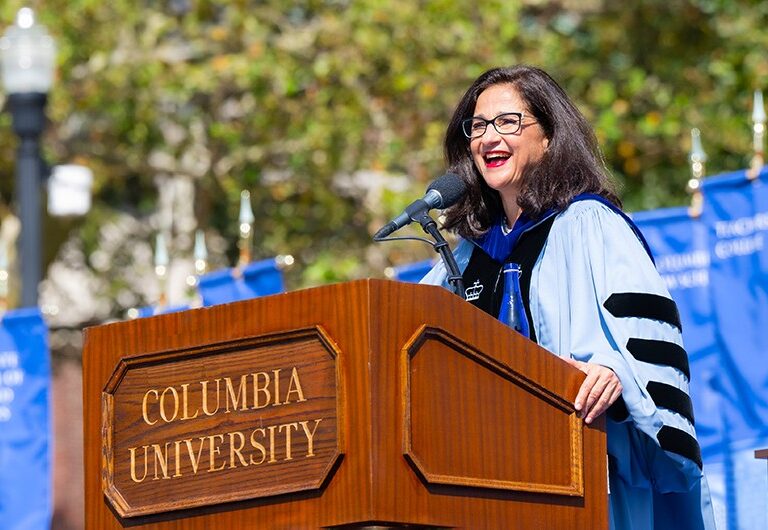President Shafik also invited her guests in this “time of great divisions in our societies—between rich and poor, amongst different races and religions, and across fundamental values and principles,” to imagine with her, how a new social contract between universities and society would look. She then outlined three pillars of that contract.
To Educate Citizens and Leaders
“The first job of universities is to educate citizens and leaders who are comfortable with rigorous debate and possess the skills and knowledge to cope with these challenges. … At a time of great divisions, the experience of reading and debating texts together creates the foundation for informed and enlightened citizens and leaders. Through their teaching, our faculty get to touch the future and shape the people who will determine it.”
To Solve the World’s Challenges
“The second part of the social contract between a great university and society is to create the knowledge that will take humanity forward—whether it is finding solutions to global warming or cancer, exploring how new technologies affect us, or finding ways to preserve our social and cultural history. University research has probably done more to advance human progress than anything else.”
To Engage With Communities
“The third pillar of a social contract for a great university is a commitment to community, at both the global and local levels. … To be an engaged citizen at Columbia is to be engaged globally AND locally. We need to do more of this, and I am eager to find a way to make such local and global engagement core to who we are as a University. … And I ask of you, as part of this new social contract, to engage wholeheartedly in becoming leaders, developing ideas that matter, and engaging locally and globally. We will ensure that the ground is well-fertilized for the future by acting boldly in the present.”
In conclusion, President Shafik quoted Jean Monnet, the architect of the European Union: “Nothing is possible without people. Nothing is lasting without institutions.” Strong institutions, she said, “have to be grounded in clear strategies, efficient and fair processes, and strong mechanisms for measuring progress. … they are the difference between consistent excellence and haphazard outcomes. I want Columbia to be an even stronger institution that can deliver big, audacious goals with confidence and consistency.”
Her vision of Columbia “is of an institution that is a friend to our neighbors, an asset to this nation, and a beacon in this world. So let us forge a new social contract with society and with each other that will make us an exemplar of a great university in the 21st century. We will construct this on a foundation built by the wisdom of our past and forge new frontiers of scholarship and service. The legacy of the Columbians who came before will live on through us, as our legacy will live on through future generations, nurtured by the commitments we reaffirm here today.
Source link

